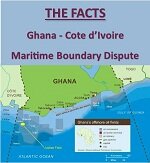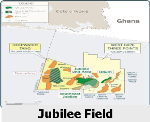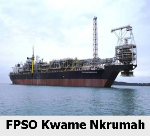OIL RELATED ENVIRONMENTAL AND HUMAN RIGHTS CONCERNS IN GHANA
- Details
- Created on Friday, 08 July 2011 07:46
OSEI BONSU DICKSON
Barrister & Solicitor
Unlike the oil blessing postulate, the oil curse hypothesis has assumed popularity in the development discourse; and rightly so because there are several environmental and human right issues concerns from environmental pollution, oil spills and environmental damage, potential demise of the local economy, the so-called "Dutch disease", social and resource conflict, health and national security risks to potential resource-poverty traps. Each of these considered individually and then jointly excite a legitimately precautionary approach to upstream petroleum exploration and development.
Environmental Pollution
Pollution of the marine environment has become a major concern in Ghana with the realization that both onshore or offshore exploration and production can generate vast quantities of hazardous waste material which may jeopardize environmental rights. In offshore operations, the major sources of pollution derives from atmospheric emissions, wastes like produced and formation water, produced sand, oily drill cuttings, drilling fluids, deck drainage, well treatment fluids, oil spills, sanitary and domestic wastes, etc. The atmospheric, marine and noise pollution which arises from the operation of oil rigs; construction of tank farms and vehicular emissions may impact negatively on air and water quality.
The Environmental Impact Assessment (EIA) report for the development of the Jubilee Field for instance confirms that support vessel and helicopter operations will emit greenhouse gases and varying amounts of other pollutants such as carbon monoxide (CO), oxides of nitrogen (Nox) and sulphur (SOx), volatile organic compounds (VOCs) and particulate matter. Compounded by gas flaring and venting, dust and emission generation the chances of poor air quality are a real possibility. Possible effects may include respiratory disorders and skin disease on workers and people in close by communities.
Furthermore there are fears that toxic waste from offshore activities such as the disposal of drilling mud and cuttings, waste material, produced and formation water with significant oil content may pollute the marine environment. The Floating Production Storage and Offloading Vessels (FPSOs), installation vessels, shuttle tankers, support vessels as well as helicopters to be used for production activities at the Jubilee Field will introduce noise into the marine environment during their entire operational life . Exposure to oil pollutants from operational activities and excessive noise from seismic survey activities for extended periods may disturb, injure or mutate fish and other marine life, hence a concern of fishermen in close by communities.
Oil Spills (Black Beaches)
There is also concern about the potentially adverse consequences of a major oil spill from offshore oil and gas activities. Accidental and operational spills from oil tankers represent a profound threat to environmental rights. Artisanal fishing and beach tourism are major economic activities along the coast of Ghana. These two sectors are thus highly susceptible to experiencing the greatest environmental and economic damage. Just like the Angolan province of Cabinda, where the locals are already complaining about their beaches turning black with oil even though industry spokespersons point to natural sources as the cause, there are concerns over the possible occurrence of a major future oil spill.
The Tullow EIA report that was presented to the EPA also estimates that a major oil spill incident at the Jubilee field will have potential impacts to marine and coastal resources, local livelihoods and economy which may be felt as far as Cote d'Ivoire.
Fishing Rights
The EIA report submitted for the development of the Jubilee Field admits that, petroleum development at the Jubilee Fields will restrict fishing access as safety exclusion zones are established around the FPSO (a 500 meter exclusion zone around drilling ships and a 1,000 meter exclusion zone around the FPSO). Fishing rights will therefore be affected. The report indicates that project sponsors will dispose of toxic waste directly into the ocean; this is likely to pollute the marine environment and exacerbate tension between the petroleum industry and fishing communities. Potential damage may as well be inflicted on fishing nets by offshore installations.
For coastal communities in the Western Region, artisanal/commercial fishing constitutes traditional livelihoods. It is therefore a major source of income. There is however no assurance that fishing communities will be compensated for either non-attributable damage or even loss of fishing rights. There is also ambiguity about what efforts are being made by the Ghanaian government to manage the emerging tension between fishing communities, the oil companies and the Ghana navy, since there are already reported incidents involving fishing boats attaching themselves to offshore rigs.
Local fishermen are reportedly worried that offshore petroleum activities will threaten artisanal fishing in the region. A recent media report indicates that for some fishermen, oil exploration is already posing a problem. Awulae Adjahe Anor III, a paramount chief in the Western region, had this to say "Our fishermen can no longer fish where they used to because of the oil rigs and that is why we need a policy document that spells out clearly how we will benefit. We are tired of the rhetoric."
The Dutch Disease
There is also considerable concern over what has being termed the "Dutch disease", an aspect of the resource curse hypothesis (which postulates that even though petroleum reserves represent a potential financial windfall for developing countries, the benefits from the resource rather exacerbates existing socio-economic and political problems within the state). The potential decline of non-oil sectors (Dutch disease) raises human right concerns to do with both the right to work and the right to development. A decline of non-oil sectors could imply a crippling of other vital sectors, which in turn has disastrous implications for the economic well-being of individual citizens in Ghana. In general, a decline in non-oil sectors might imply a gradual collapse or evaporation of jobs in Ghana's agricultural or manufacturing sectors. Antagonists have, however, countered by asserting that an occurrence of the Dutch disease in Ghana, is exaggerated and most unlikely, since relatively the country's oil discovery is not so vast as to create a natural over-dependence even beyond twenty years.
Ocean-Use and Resource Conflict
The emergence of offshore oil and gas exploration and production, introduces multiple and competing uses of the ocean, (i.e. for fishing, petroleum drilling, oil bunkering, navigation, etc) with the added risk of ocean-use conflicts in the absence of a clear policy clarifying no-go areas or protecting fishing interests.
Natural resource extraction also have a capacity to attract migrant labor from outside communities to work, live and compete with locals for scarce resources. This may affect the realization of right to housing, education, health and food in the community. From a conflict perspective this may inflate social pressure and exacerbate conflict, partly as a result of the increasing population's unmet needs for social amenities. As land in and around resource communities' also appreciates in real and speculative value the prospects of land disputes might also appreciate.
Health and National Security Threats
There is also concern over a likely increase in disease transmission as remote, marginalized but oil-rich settlements rapidly transform into attractive economic areas. Mass influx of diverse people (new workers and their families) could, therefore, have new public healthcare implications for such communities.
There are also national security concerns posed by the resurgence of terrorism and piracy. Critical infrastructure like petroleum installations - vessels, tankers, platform equipment, and subsea pipelines are opportunistic targets for pirates, insurgents, terrorists, secessionists or rebels who might see the prospect of controlling petroleum resources as strategic for advancing particular causes, or who just wish to make important political and ideological statements. Poor and restless communities contiguous to Cape Three Points could even therefore be of recruitment value to potential militants.
Revenue Transparency and Accountability
Another issue of interest is revenue transparency and accountability; probably because most resource-rich countries that have not ensured transparency in revenue management have performed poorly on the Corruption Perception Index (e.g. Guinea, Nigeria, Congo D.R., Zambia and Ghana, and are further at the bottom of the World Bank Human Development ranking). Thus, there may exist some negative correlation between transparency and levels of corruption and human development. The less transparent a country, the more corrupt and underdeveloped it is. Again a draft report by the Foundation for Environmental Security and Sustainability suggests (citing Pendleton, 2004) that the threat of conflict appreciates where oil revenues do not appear to benefit the local community or where national oil funds created for the benefit of the populace lacks transparency in terms of its distribution.






